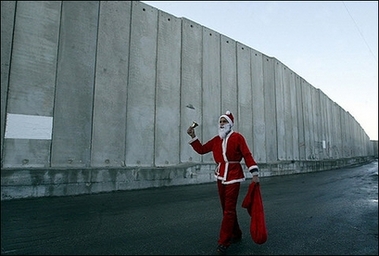

By Mazin Qumsiyeh
"It is at Christmastime that the sometimes-beautiful and sometimes-poignant childhood memories of Bethlehem haunt me and other Palestinian Christians most vividly.
Born in Shepherd's Field near Bethlehem to a Lutheran mother and a Greek Orthodox father, I grew up feeling lucky because we celebrated two Christmases. The Christmas season was a time of family gatherings around kerosene heaters where our fingers were cold but our hearts were warm and stomachs full.
Today, Christmas is a time to reflect on the tragedy that has befallen this most famous of little towns. Israel militarily occupied Bethlehem in 1967, but the landscape had begun to change well before that. In 1948, Bethlehem became home to thousands of Palestinian refugees after more than 750,000 people were driven from their homes in what became Israel. Palestinians were forbidden to return, and the cramped refugee camps of Dheisheh and Aida on the outskirts of Bethlehem remain testaments to this nearly 60-year legacy of dispossession.
After 1967, Israel built new illegal settlements on annexed Palestinian public and agricultural lands and Israeli-only roads to connect these settlements to Israel and one another. We could do nothing but watch as increasing portions of our homeland became off-limits to Palestinians. The only forested region of East Jerusalem, Jabal Abu Ghneim -- where I used to picnic and walk almost daily -- became the Jewish settlement of Har Homa.
Today, Bethlehem is surrounded by the settlements of Gilo, Har Gilo, and a new settlement near Rachel's tomb. The tomb is holy to Christians, Muslims and Jews but is now off limit to Palestinians, including relatives of the hundreds of Palestinian Muslims buried there.
Since 2002, Bethlehemites have faced the enormous human costs of a massive, concrete segregation wall. During my visit last July, I noticed that the route of the wall zigzagged around Bethlehem, placing fertile Palestinian agricultural lands on the "Israeli side" of the wall. The wall went straight through centuries-old villages - separating Palestinian families from each other and from their jobs, hospitals, schools, churches and mosques.
Many of my relatives have lost jobs in Jerusalem, a mere six miles away, because it is virtually impossible for West Bank Palestinians to obtain permits to enter Jerusalem. Even with a permit, checkpoints make travel unpredictable and often impossible, precluding reliable work attendance. Although I have an American passport, I am denied entry to East Jerusalem, where I taught high school. At Bethlehem University, where my brother has taught mathematics for 25 years, the wall and checkpoints mean many faculty and students can no longer make it to school. The biblical and literal path from Nazareth to Bethlehem is blocked by checkpoints and thirty-foot high slabs of concrete.
I am saddened when I see how Bethlehem has been transformed. A once-thriving community is stifled, isolated and desperate. Tourism has plummeted, jobs are scarce and Christian Palestinian families are leaving. At Christmastime, typically a period of joy and hope, this grim reality hits especially hard.
Israel's desire to acquire maximum geography with minimum Palestinian demography is the root of the suffering afflicting the Holy Land. Amnesty International has observed that the peace processes failed because Israel has ignored human rights, including the right of native Palestinians to return to their homes and lands. There is now a broad international consensus (with the exceptions of the US and Israeli governments) on the danger to international peace and security posed by Israel's continued violations of human rights and international law.
Although Israel's actions are given diplomatic and financial cover by my adopted country of America, I feel hopeful. Jimmy Carter's new book "Palestine: Peace not Apartheid" marks the first time a major US politician recognized publicly the reality of discrimination against the Christians and Muslims of Palestine. The Iraq study group has recommended resolution of the Israeli-Palestinian conflict as critical to regional stability. People are increasingly pausing to reconsider the value of our government's unconditional support for Israel. We need our politicians to follow suit. In this season celebrating the birth of the Prince of Peace, let us all resolve to pray and work for justice in the holiest of lands.
May this holiday season and the new year bear the fruits of the collective hard work for peace with justice to all people."

No comments:
Post a Comment